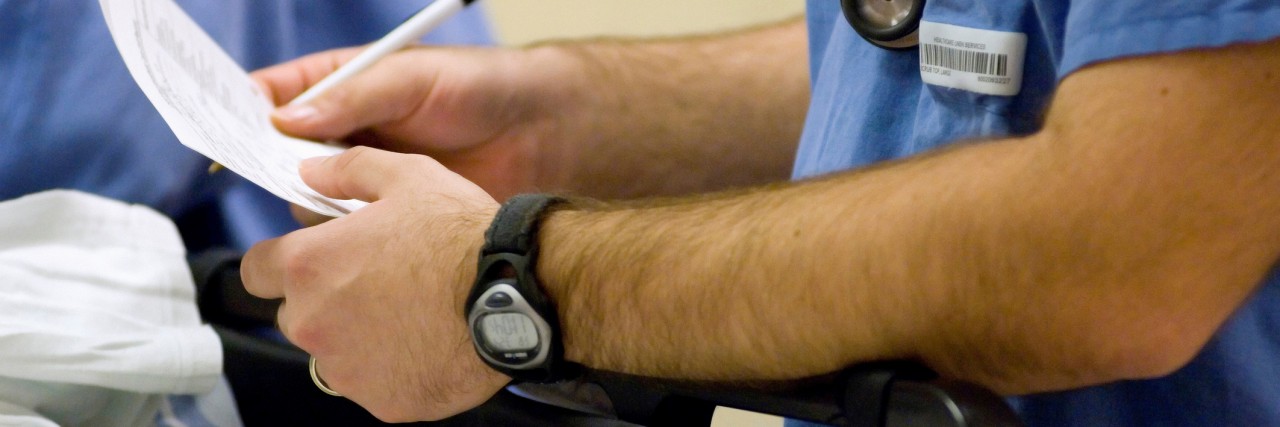As we age, I think we build a mental library of “what the hell” moments. Through my medical journey, I’ve stared blankly at my fair share of people, taking in every detail for my WTH library. Lately, those moments have been the fuel for my anger. They make me wonder if the people we go to for help forget that we’re intelligent, competent or even human.
Since April, my ileostomy stoma has been the Sheldon to my Leonard. Struggling to live with him, but unfortunately can’t live without him. However, my version of “The Big Bang Theory” lacked the laugh track and genius best friends. I’ve been struggling with intense, sharp pain and mechanical malfunctions on a daily basis. Imagine the stinging pain of a scraped knee. Amplify it times four and place all that pain in your guts. Finally, throw in some obstructions and strictures, sprinkle in a few ileuses and bake at 350 degrees for 30 minutes. You’ve successfully made a pain that no one believes.
“Pain in your stoma? You mean around your stoma.”
“That’s not possible. Intestines have no nerve endings; they can’t ‘feel’ anything.”
Six months of ER visits, doctors’ appointments, pain, nausea, bleeding, the works, and these are the answers I get? I don’t have a medical degree, so how could I possibly understand my body? How could I accurately pinpoint the “discomfort” I feel within the body I have lived in for 25 years without that expensive piece of paper? Silly me.
“You look better than the last time I saw you, so it must not be that bad.”
No, you didn’t read that wrong. Yes, those words came from a medical professional. They were spoken before and after I was left in an ER room for three hours, waiting on a doctor who placed me on his lowest priority due to the above statement to even evaluate me. I sat for six hours before it was decided the specialists that could help me left two hours before my discharge. The next week, an exam found multiple ulcers terrorizing my ileum. They were the reason behind my pain. Pain, not discomfort or irritation. Pain. The ulcers were real. They were there. I had proof! I was finally going to get help!
Pfft.
Even with the exam and four months’ worth of CT scans showing the latest damage done by Crohn’s disease — nothing.
“Give it time. It takes time to work.”
“But you’re gaining weight, so that’s good.”
How much more time can I give something when my body is destroying itself? What am I supposed to do in the mean time? Ignore the bleeding? Laugh off the scream-worthy pain? Did you forget you’ve placed me on medication to up my appetite? And that the majority of my other pills have weight gain as a side effect? Are you kidding me?
I understand medical professionals may just see me as a file in their office. I know they don’t have to live with this body or cohabitate with me — living with the constant reminder that something’s not right. But I am a patient. I am a human being. I am a 25-year-old adult who had to place her professional and educational aside to care for this debilitating disease. I am a person who wakes up every day too nauseous to move because her guts are too inflamed to digest anything from the day before. I am stuck at home, foggy from the fatigue, pain and loads of medications it takes to even get me out of bed. I am the person people forget. But remember, I am so much more.
Before you feel the need to correct me or hurry to get me out of your office, remember my life revolves around all of this. We may only visit for a few minutes each month, but there are 43,800 minutes that I must survive until we’re sitting here again.
In those 43,800 minutes, 35,000 of them may be spent in distress. That leaves only 8,800 minutes to be a responsible adult. I have to cram to make an income, care for my loved ones, uphold familial and social responsibilities and, hopefully, make time to care for me in that time. That’s only 146 hours out of the month — that’s 20 percent! Any of the above mentioned quotes make me wonder if you think I’m only worthy of 20 percent.
Those “what the hell” moments make me wonder if you forget we are equals, merely separated by expensive certificates and a faulty immune system. Yes, you’ve got the know-how on what a body does. But I’ve got the know-how on my body. I know when something is wrong, where it’s wrong and how important it is to remedy it. And it is important. Period. It’s important to help me achieve stability. It’s important to explain a game plan and for us all to agree on it. It’s important that we’re a team working toward the same goal, and that I can trust you.
You’re trusting me to be honest and give it my all. I need to trust you to sense my urgency, acknowledge my pain and not be the head author in my WTH library. Because I’m sure that’s one library you would not want to brag about at the next Christmas party.
We want to hear your story. Become a Mighty contributor here.
Lead photo by Thinkstock Images

